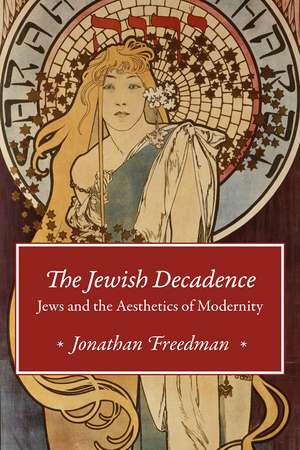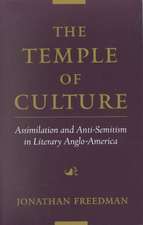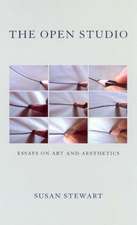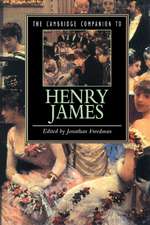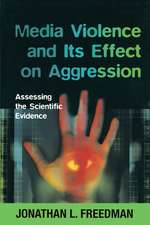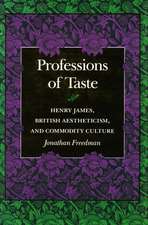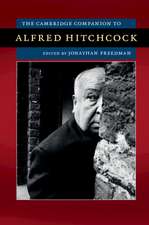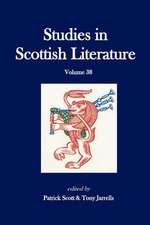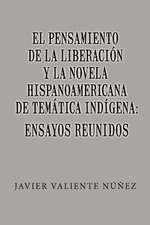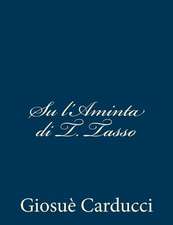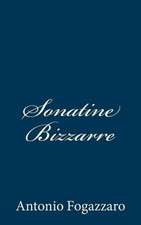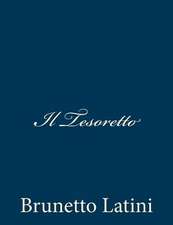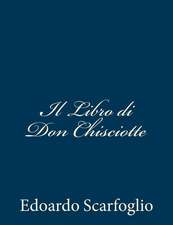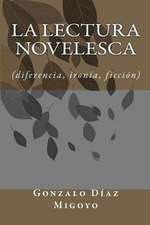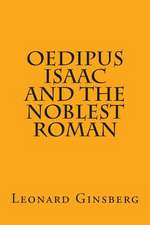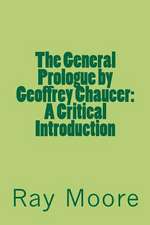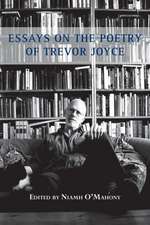The Jewish Decadence: Jews and the Aesthetics of Modernity
Autor Jonathan Freedmanen Limba Engleză Paperback – 26 apr 2021
The first to tell this sweeping story, Freedman demonstrates the centrality of decadence to the aesthetics of modernity and its inextricability from Jewishness. Freedman recounts a series of diverse and surprising episodes that he insists do not belong solely to the past, but instead reveal that the identification of Jewishness with decadence persists today.
| Toate formatele și edițiile | Preț | Express |
|---|---|---|
| Paperback (1) | 207.87 lei 3-5 săpt. | +16.03 lei 4-10 zile |
| University of Chicago Press – 26 apr 2021 | 207.87 lei 3-5 săpt. | +16.03 lei 4-10 zile |
| Hardback (1) | 608.36 lei 6-8 săpt. | |
| University of Chicago Press – 19 apr 2021 | 608.36 lei 6-8 săpt. |
Preț: 207.87 lei
Nou
Puncte Express: 312
Preț estimativ în valută:
39.78€ • 41.10$ • 33.11£
39.78€ • 41.10$ • 33.11£
Carte disponibilă
Livrare economică 04-18 martie
Livrare express 15-21 februarie pentru 26.02 lei
Preluare comenzi: 021 569.72.76
Specificații
ISBN-13: 9780226581088
ISBN-10: 022658108X
Pagini: 304
Ilustrații: 41 halftones
Dimensiuni: 152 x 229 x 25 mm
Greutate: 0.42 kg
Ediția:First Edition
Editura: University of Chicago Press
Colecția University of Chicago Press
ISBN-10: 022658108X
Pagini: 304
Ilustrații: 41 halftones
Dimensiuni: 152 x 229 x 25 mm
Greutate: 0.42 kg
Ediția:First Edition
Editura: University of Chicago Press
Colecția University of Chicago Press
Notă biografică
Jonathan Freedman is the Marvin Felheim Collegiate Professor of English, American Studies, and Judaic Studies at the University of Michigan. He is the author of Professions of Taste: Henry James, British Aestheticism, and Commodity Culture; The Temple of Culture: Assimilation, Anti-Semitism, and the Making of Literary Anglo-America; and Klezmer America: Jewishness, Ethnicity, Modernity.
Cuprins
Preface, by Daniel Hack and Amy Hungerford
Introduction: “Our Two-Step Is the Modern Decadence!”
1 Qu’est-ce que c’est la décadence? And What Does It Have to Do with Jews?
2 Oscar Wilde among the Jews
3 Salomania and the Remaking of the Jewish Female Body from Sarah Bernhardt to Betty Boop
4 Coming Out of the Jewish Closet with Marcel Proust
5 Pessimism, Jewish Style: Jews Reading Schopenhauer from Freud to Bellow
6 Walter Benjamin’s Paris, Capital of Jewish Aesthetic Modernity
7 Dybbuks, Vampires, and Other Fin-de-Siècle Jewish Phantasms
Conclusion: The Deca-danse; or, The Afterlife of the Jewish Decadent
Notes
Index
Recenzii
"It is chock-full of exciting and provocative ideas, but it is also just plain fun — something akin to Freedman leading the reader by the hand on a tour of a cultural landscape that he knows like the back of his hand."
"This is a profoundly important book in Jewish Studies, as well as among the cultural and literary criticism of its artistic subject."
"Erudite, gossipy, nuanced, funny, and moving. . . Freedman serves as collector culling materials from a wide array of sources, arranging them into an often dizzying but unfailingly interesting and almost always entirely persuasive account that supports his thesis, each time from a different direction."
"Overall, The Jewish Decadence is a richly rewarding read, blending deep knowledge, provocative insight and unsparing honesty to the role Jews have played in fin-de-siècle culture of Europe and the USA. Barely a page goes by with an insight into cultural production and consumption and unexpected links between creators, places and ideas. This book will be of value to anyone wishing to under early Modernism and Jewish contribution to vanguard art."
"Freedman’s argument, that Jewish novelists, poets, actors, and philosophers reworked the
discourse of decadence, which often linked Jewishness to decline, to their own ends in order
to generate a Jewish response to the conditions of modernity, is compelling. More importantly,
it offers a model of how work on afterlives and transnational circulation can avoid the trap of
thinking in terms of unidirectional influence and attend to the agency and creativity of those
influenced."
discourse of decadence, which often linked Jewishness to decline, to their own ends in order
to generate a Jewish response to the conditions of modernity, is compelling. More importantly,
it offers a model of how work on afterlives and transnational circulation can avoid the trap of
thinking in terms of unidirectional influence and attend to the agency and creativity of those
influenced."
Bringing his capacious cultural expertise and scholarly rigor to a wide-ranging exploration of the association between Jews and decline and degeneracy, Jonathan Freedman performs an erudite, original, and wonderfully chutzpadik act of reclamation.
“This book takes us on an extraordinary journey through what the author calls ‘something like modernity,’ as it is to be found in dance, literature, song, painting, theatre, film, and history. Decadence turns out to mean what it seems to mean, and an almost unimaginable range of other things as well. Its richness, as well as its constant entanglement in ideas of Jewishness, would have caused any other writer either to simplify or get lost, but Freedman wittily and resolutely does neither. His book is ‘example-drunk,’ as he says, but it doesn’t stumble. It celebrates complication and reflection and masquerade, and we find ourselves wishing the show—the one he is evoking and the one to be seen in the fabulous evocation itself—would never end.”
“Freedman reconceives of Jews as architects rather than victims of modernity. Although Jews were often demonized as sexual and artistic deviants, they also entered into dialogue with their detractors by contesting or reshaping the prejudices of the day. Most important, Jews played a central role in European culture as artists, critics, sponsors, networkers, and entrepreneurs; throughout the book, Freedman spots Jews where none have been discerned before, testifying to their ubiquity among the avant-garde.”
"A book that transforms our experiences of familiar works and encourages us to carry on the work of Jewish cultural studies, following the example of one of its most gifted practitioners."
